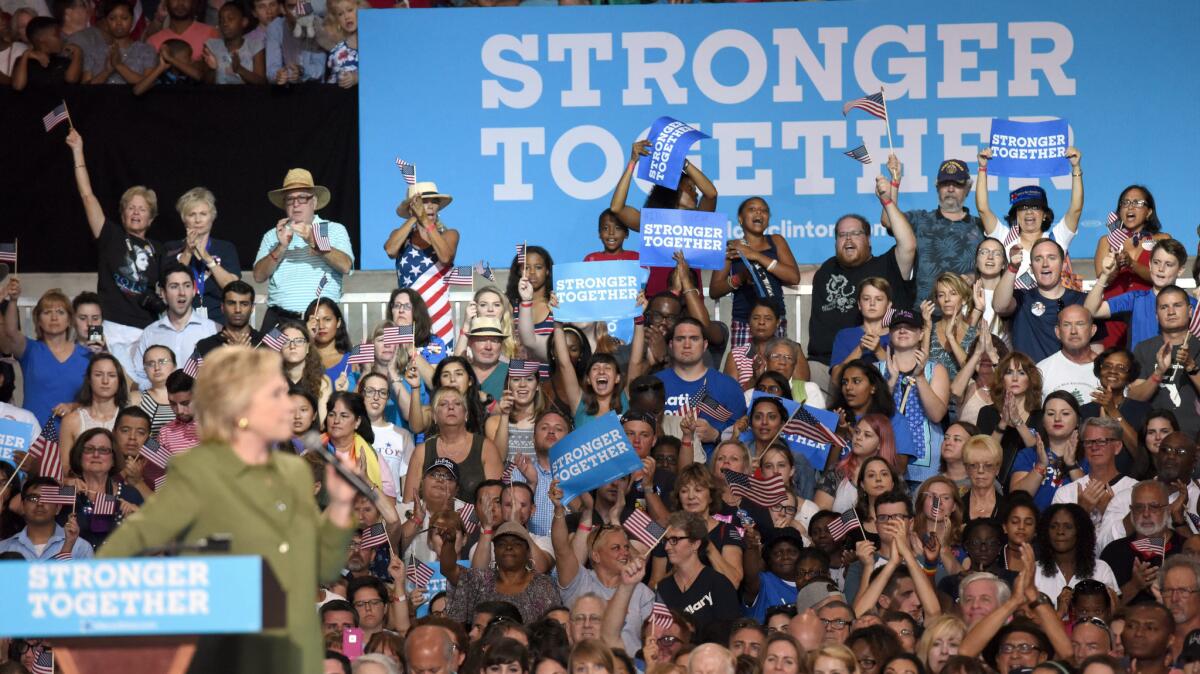Editorial: The Democratic convention is Hillary Clinton’s chance to get voters to trust her

- Share via
Delegates gathering in Philadelphia on Monday for the Democratic National Convention have a lot to be thankful for.
President Obama has seen a rise in his job approval ratings. That’s good news for Hillary Clinton, who served as his secretary of State and is promising in her campaign that she will build on his accomplishments.
Sen. Bernie Sanders, the democratic socialist from Vermont who ran a surprisingly strong campaign, has endorsed Clinton. Yes, some of his followers continue to grumble about a “rigged” nomination process, but the vast majority of them tell pollsters they will back Clinton in November.
A platform was drafted relatively amicably that incorporates themes dear to Sanders and his supporters — particularly criticism of trade agreements that “do not support good American jobs” — without straitjacketing Clinton.
Finally, in Donald Trump the Republican Party has nominated a candidate with no experience in government, a volatile temperament and a habit of bashing immigrants and Muslims and belittling women. Trump’s bluster and bigotry can only motivate minority and female voters to turn out for Clinton and her seasoned running mate, Sen. Tim Kaine (D-Va.), who was a civil-rights lawyer before becoming a politician.
Yet despite these advantages, Democrats have good reason to be concerned about their prospects in the general election. The party needs to use this convention not only to emphasize the dangers of a Trump presidency — for the entire nation, not just for women, minorities and the poor — but also to address concerns about its own candidate.
A CBS News/New York Times poll conducted this month found that 67% of respondents considered Clinton ‘not honest or trustworthy.’
Hillary Clinton, who will be the first woman selected as the presidential nominee of a major political party, is one of the best-prepared and most knowledgeable candidates ever to seek the presidency. She would have been formidable competition for the Republican Party even if it had nominated a credible candidate; in a contest with Trump, the credentials gap is cavernous. Yet many voters have doubts about her — doubts Trump already has begun to exploit.
Polls suggest that large numbers of voters question Clinton’s integrity and honesty. A CBS News/New York Times poll conducted this month found that 67% of respondents considered her “not honest or trustworthy.” The poll was taken after FBI Director James B. Comey told the nation that Clinton and her aides had been “extremely careless” in transmitting classified information on a private email server.
Of course, Comey also concluded — and the Justice Department agreed — that “no reasonable prosecutor” would bring criminal charges in the case. That didn’t stop Trump from claiming falsely in his acceptance speech that Clinton was guilty of “terrible crimes.”
Clinton, for her part, has said repeatedly that she made a mistake in setting up a private email system. But she has also rejected the FBI’s finding that her behavior was “extremely careless” and has dismissed as speculation Comey’s concern that “hostile actors” might have gained access to her email account. This comes across as quibbling and evasive. As for larger questions about her trustworthiness, she tends to shrug them off as politically motivated.
In an interview with the Los Angeles Times editorial board, she said: “When I’m actually doing a job on behalf of people, people who elected me, as in the case of the voters of New York — or in the country when I was secretary of State — I actually have quite high approval ratings [and] when there’s no political or partisan imperative to try to tear me down and attack me from all directions, people actually approve of what I stand for and what I do.”
That may be true, but before that hypothesis can be tested in the White House, Clinton must be elected. That is much more likely to happen if she can dispel voters’ concerns about her charitable foundation, about her Wall Street speaking fees, about her private email server.
Clinton will, and should, use her acceptance speech to provide a vision of what she hopes to accomplish as president and to excoriate Trump for his extremism. But beginning this week and continuing throughout the campaign, she will have to work hard to make voters trust her. She is a steady and serious candidate with a commanding grasp of the issues. Going beyond her usual perfunctory defensive responses is an important step toward winning voters to her side.
Follow the Opinion section on Twitter @latimesopinion and Facebook
More to Read
A cure for the common opinion
Get thought-provoking perspectives with our weekly newsletter.
You may occasionally receive promotional content from the Los Angeles Times.










